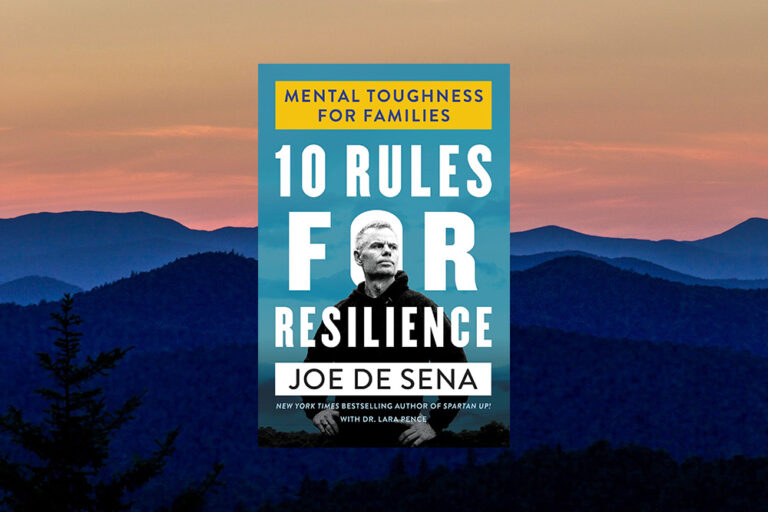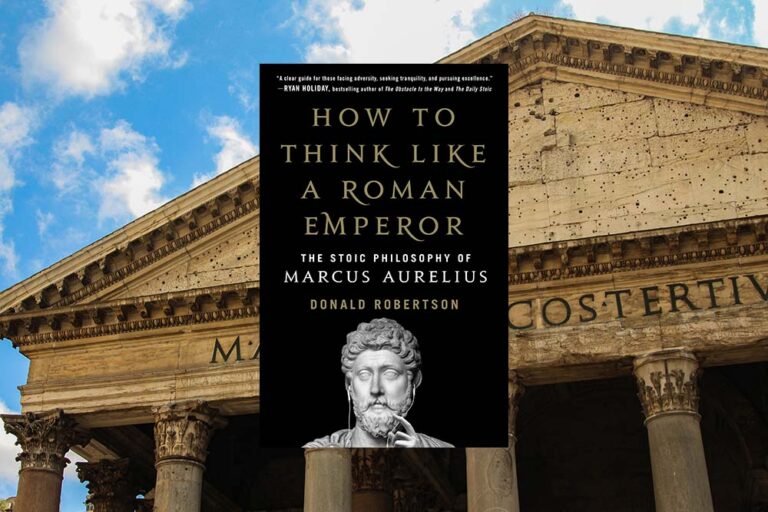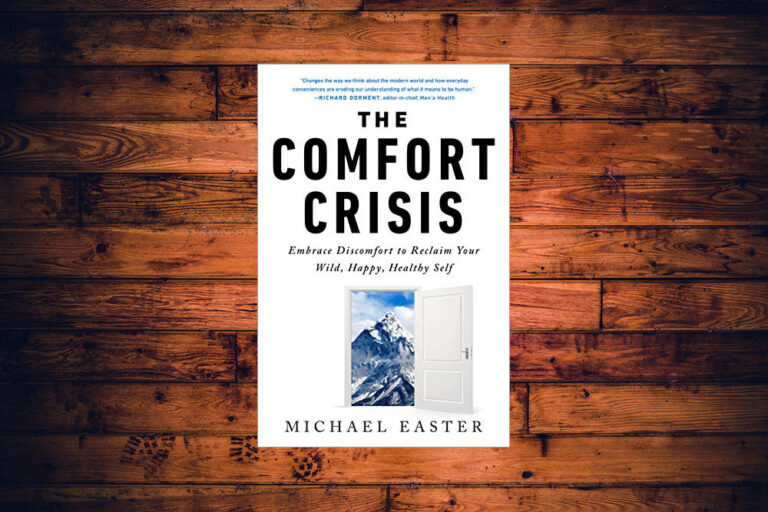#11: How to Cultivate Self-Awareness Like a Stoic. Practical Stoic Wisdom From “How to Think Like a Roman Emperor” by Donald Robertson (Part 2)

In the second part of my notes from How to Think Like a Roman Emperor: The Stoic Philosophy of Marcus Aurelius by Donald Robertson we’ll talk about self-awareness.
What does self-awareness have to do with discomfort?
Much more than you think.
If you aren’t aware of your thoughts, you don’t control your actions. You won’t notice when uncomfortable emotions like fear get the best of you.
If you aren’t aware of your progress, you don’t know if you’re going in the right direction. You won’t notice the excuses you make to avoid the work you need to do.
If you aren’t aware of your values, you don’t know what behaviors go against the character you’d like to cultivate. You won’t notice when you’re betraying your most important goals.
How do we avoid these traps? That’s what today’s article is about.
Never Relax Your Vigilance
If we wish to improve ourselves, Galen says that we must never relax our vigilance, not even for a single hour. How on earth do we do that? He explains that Zeno of Citium taught that “we should act carefully in all things—just as if we were going to answer for it to our teachers shortly thereafter.” That’s a rather clever mind trick that turns Stoic mentoring into a kind of mindfulness practice. Imagining that we’re being observed helps us to pay more attention to our own character and behavior. A Stoic-in-training, like the young Marcus, would have been advised always to exercise self-awareness by monitoring his own thoughts, actions, and feelings, perhaps as if his mentor, Rusticus, were continually observing him. Epictetus told his students that, just as someone who walks barefoot is cautious not to step on a nail or twist his ankle, they should be careful throughout the day not to harm their own character by lapsing into errors of moral judgment.
We need to cultivate self-awareness constantly, not just when we remember to do it. It will help us uncover our failings right as they happen and not afterward when it’s too late to fix them.
If you’re vigilant only when actively pushing yourself—for example when working out—you’ll miss out on opportunities to improve in mundane circumstances.
Act as if every situation in your life is a test of your character. To raise the stakes, imagine that your role model is always watching you and judging if you’re worthy of his attention.
Say you’re walking down the hallway to your office and notice a crumpled piece of paper on the ground. If you never relax your vigilance, you’ll realize that it’s an opportunity to do the hard thing:
EASY: Ignore it because it’s not your job to keep the office tidy.
HARD: Pick it up and throw it away because you take ownership at work no matter what it is.
And who knows, maybe your boss is watching you.
Now let’s say you’re driving back home. An elderly driver in front of you drives slowly and you can’t safely pass him. If you never relax your vigilance, you’ll realize this is yet another exercise to choose the hard thing:
EASY: Honk at the man and shout expletives.
HARD: Accept the situation and stay in control.
And who knows, maybe a friend is in another car stuck in the traffic watching your reaction now.
You’re back home, relaxing in front of the TV after a long day. Your kids want to play with you for ten minutes before they go to bed. You’re exhausted. All you want to do is keep watching your favorite show. It’s yet again time to decide:
EASY: Tell them you’ll play together tomorrow because you’re too tired.
HARD: Turn off the TV and give your kids your full attention, exhausted or not, because you want to be a great dad.
It’s not only your kids who are watching you now. Maybe your wife is watching you as well and it’s your chance to show her how devoted you are to your family.
Are these tiny decisions? Of course.
Does it mean you ignore them and focus only on the bigger aspects of embracing discomfort? Not at all.
Stoic philosophy (or any philosophy for that matter) asks you to live according to your values all the time, not just when it’s most convenient for you. Every decision counts to build your character as a man who isn’t afraid of discomfort.
Contemplate the Qualities of Wise Men
Marcus tells himself to focus his attention on the minds of wise men, particularly their underlying principles, and carefully consider what these men avoid and what they pursue in life. In The Meditations, he names the philosophers he most admires: Pythagoras, Heraclitus, Socrates, Diogenes the Cynic, Chrysippus, and Epictetus. Of course, you might even choose Marcus himself as a role model if you’re studying his life and philosophy. Your first step is to write down the virtues exhibited by someone you respect. Listing the qualities you most admire in another person, just as Marcus does in the first book of The Meditations, is a simple and powerful exercise. He explains in a later chapter that he contemplates the virtues of those who lived with him in order to raise his spirits: the energy of one, the modesty of another, the generosity of a third, and so on.
In this suggestion, I particularly like contemplating specific virtues of other people. No person is perfect but everyone has their own strengths to admire and emulate.
You may contemplate the raw charisma and no-bullshit attitude of David Goggins while also studying the calm demeanor of Marcus Aurelius.
You may get inspired by the mental toughness of mountaineer Nirmal Purja while also appreciating the lessons from Auschwitz survivor Eddie Jaku.
You may follow the example of strong work ethic displayed by rock climber Tommy Caldwell while also learning how to let go of all tension like freediver William Trubridge.
Autobiographies are one of the best sources for contemplating wise men. They let you explore the minds of people you admire and explore ideas on what qualities to cultivate in yourself.
Contemplate Your Ideal You
In addition to the virtues of real people, the Stoics were also known for contemplating the hypothetical character of an ideal Sage, or wise person. There are several passages where Marcus appears to be doing this. These descriptions inevitably seem a bit more abstract and grandiose. For example, he says that the perfect wise man is like a true priest of the gods, at one with the divine element of reason within himself. He is neither corrupted by pleasure nor injured by pain, and he remains untouched by insults. The true Sage is like a fighter in the noblest of fights, dyed deep with justice. With his whole being, he accepts everything that befalls him, as assigned to him by Fate. He seldom concerns himself with what others say or do unless it’s for the common good. He naturally cares for all rational beings, as though they were his brothers and sisters. He is not swayed by the opinions of just anyone, but he gives special heed to the wise who live in agreement with Nature. Marcus is trying here to describe human perfection to himself and to envisage an ideal Sage who completely embodies the Stoic goals of life.
In addition to asking ourselves what qualities the ideal wise person might have, we can ask what qualities we might hope to possess in the distant future. For instance, what sort of person would you hope to be after having trained in Stoicism for ten or twenty years?
If you’re reading this article, you know how valuable embracing voluntary discomfort is. It helps you achieve bigger and bigger things and push your limits in every aspect of your life. Without it, you’ll get soft, weak, and unable to face adversity in life.
How would an ideal man who welcomes discomfort in his life act? How would he withstand pain? What would he do in the face of crushing hardships? What habits would he cultivate every day? What he wouldn’t do? How would he embody mental toughness in every aspect of his life?
How would you like to act having practiced voluntary discomfort for one, two, five, ten, or twenty years?
Asking yourself these questions will give you practical answers how to carry yourself every day.
Once you have described your ideal you, remind yourself of it every time you face doubts, come up with excuses, or feel the temptation to quit. Let your imagined role model inspire you to reach for more so that over time you get closer and closer to living your ideals.
Morning Meditation Practices
Regarding the morning meditation, Galen says that as soon as you rise from bed and begin considering each of the tasks ahead, you should ask yourself two questions:
1. What would the consequences be if you acted as a slave to your passions?
2. How would your day differ if you acted more rationally, exhibiting wisdom and self-discipline?
Marcus discusses how to prepare for the day ahead at least four times in The Meditations. He mentions that the Pythagoreans used to contemplate the stars each morning, thinking of their consistency, purity, and nakedness as symbolic of man living with wisdom, virtue, and simplicity. He likewise tells himself on awakening that he is rising to fulfill his potential for wisdom and not just to be a puppet of bodily sensations, swayed by pleasant feelings or turned aside by discomfort. He tells himself to love his nature and his capacity for reason, and to do his best to live accordingly.
Starting your day the right way can make the difference between having a productive one and a wasteful one.
The two questions posed by Galen will help you prepare for the day ahead by remembering not to live your life the easy way. You can also ask yourself a variation of these questions:
1. What would the consequences be if you avoided all discomfort?
2. How would your day differ if you welcomed challenges, discomfort, and opportunities to grow?
As you get up, remind yourself that the day ahead provides an opportunity to pursue excellence. It will set the right tone for the day, particularly when followed by voluntary discomfort (a cold shower, a morning run, a workout, etc.).
Set some tiny resolutions for each day, too, for example:
- “I’ll stay calm when talking with a person who has a different opinion.”
- “No matter how unpleasant it is, I’ll keep stretching my hips throughout the day.”
- “I won’t allow myself to procrastinate on the hardest tasks.”
Evening Meditation Practices
This famous passage from “The Golden Verses,” which Epictetus quoted to his students, describes the evening meditation:
Allow not sleep to close your wearied eyes,
Until you have reckoned up each daytime deed:
“Where did I go wrong? What did I do? And what duty’s left undone?”
From first to last review your acts and then
Reprove yourself for wretched acts, but rejoice in those done well.
You can ask yourself these three very simple questions:
1. What did you do badly? Did you allow yourself to be ruled by irrational fears or unhealthy desires? Did you act badly or allow yourself to indulge in irrational thoughts?
2. What did you do well? Did you make progress by acting wisely? Praise yourself and reinforce what you want to repeat.
3. What could you do differently? Did you omit any opportunities to exercise virtue or strength of character? How could you have handled things better?
If morning meditation practices prepare you for the day ahead, then evening meditation practices are for reviewing how that day went.
Take a few minutes each evening to contemplate your day. It will help you spot common challenges and brainstorm ways to handle them better next time.
Did you honor the promise you gave yourself in the morning?
Did you embrace challenges or grumble about them?
Did you let laziness overpower you or did you resist it?
What did you do well?
What could you do differently to display more mental resilience tomorrow?
What pitfalls should you be more aware of?
In what areas could you improve more?
Foster Self-Awareness Throughout the Day
You can also foster self-awareness by questioning yourself regularly throughout the day in the way the Stoics describe. For example, Marcus frequently examines his own character and actions, perhaps posing the sort of questions a Stoic mentor might have asked. He asks himself, in different situations, “What use am I now making of my soul?” He probed his own mind, scrutinizing the fundamental values he was taking for granted. “Whose soul do I now have?” he would ask. “Am I behaving like a child, a tyrant, a sheep, a wolf, or am I fulfilling my true potential as a rational being? For what purpose am I currently using my mind? Am I being foolish? Am I alienated from other people? Am I letting myself be dragged off course by fear and desire? What passions are there right now in my mind?”
Fostering self-awareness throughout the day comes down to righting your ship each time it veers off course. Don’t wait for your evening meditation to scrutinize yourself and contemplate how to do better.
If you notice yourself giving excuses as to why not do something hard, stop yourself right there and course correct.
One of my key daily practices is to be ultra-aware of negotiating with myself. For example, if I have an extra workout planned for the day, telling myself “Maybe I’ll do it tomorrow,” or “It’s optional, nothing bad will happen if I skip it” is an example of negotiating with myself. The longer I engage in it, the higher the risk of talking myself out of an uncomfortable undertaking.
But don’t just focus on what you’re doing wrong as you’re doing it. Also ask yourself how you can avoid temptations later in the day.
For example, if you know that taking a nap in the afternoon makes you so lazy that you skip your evening stretching, remind yourself to avoid napping at all costs.
Don’t forget about your morning resolutions, either. If you promised yourself not to get angry when talking with someone who has a different opinion, periodically ask yourself how well you’re doing. You can even quickly review each interaction you have to make sure you’re on the right track.
How to Develop a Clearer Sense of Direction in Life
By deeply reflecting on our values each day and attempting to describe them concisely, we can develop a clearer sense of direction in life. You might do this by posing questions to yourself such as:
• What’s ultimately the most important thing in life to you?
• What do you really want your life to stand for or represent?
• What do you want to be remembered for after you’re dead?
• What sort of person do you most want to be in life?
• What sort of character do you want to have?
• What would you want written on your tombstone?
The questions above are a good start to uncover your core values. Combined, they will help you uncover your life purpose. It will be the strongest motivator you’ll have to withstand discomfort and pursue excellence.
For example, here’s how you may answer these questions:
• What’s ultimately the most important thing in life to you?
The most important thing in my life is to make it count. I want to die knowing that I made the most out of it and welcomed everything it threw at me.
• What do you really want your life to stand for or represent?
I want my life to stand for good choices. I want it to represent the values of self-discipline, grit, and constant self-improvement.
• What do you want to be remembered for after you’re dead?
I want to be remembered for being the most helpful person they knew. I want them to remember how I was always ready to help and support, no matter how hard the situation was.
• What sort of person do you most want to be in life?
I want most to be a person who is always in control. I want to invest my time in seeking solutions rather than making excuses. I want to always choose the path that benefits me most in the long term.
• What sort of character do you want to have?
I want to have a character defined by composure, patience, and resilience.
• What would you want written on your tombstone?
He never stopped growing, showing everyone around how to make the most of their limited time on Earth.
Don’t get frustrated if at first you can’t answer these questions in a satisfying way. It may take weeks, months, or years to figure out what you want your life to stand for. What matters is to periodically ask yourself these hard, uncomfortable questions and get closer to your own truth.
Rate Your Daily Performance
Try brainstorming small ways in which you can do things that satisfy your core values each day. Don’t be too ambitious; just begin with small changes. Then during your evening meditation, you might literally give yourself “marks out of ten for virtue,” or rather for living up to your core values. This will encourage you to think more deeply about ways you can progress toward embodying your values. Remember: the fundamental goal of life for Stoics, the highest good, is to act consistently in accord with reason and virtue.
If you’re rating yourself on a scale of one to ten, how would your day have to look like to get a perfect score?
How would it look like if you could only give yourself a five?
How would it look like if it was an embarrassing one?
Jot down your score and aim to keep it consistently high. It’s better to hit 7/10 on most days than hit 10/10 on one day, 3/10 on the second, and 6/10 on the third.
Questions to Ponder
1.How would your everyday behavior change if there was someone watching and evaluating you all the time?
2. Which men do you admire and which of their qualities would you like to emulate?
3. What qualities your ideal future you would have? How can you cultivate them in yourself today?
4. How do you mentally prepare yourself for the day ahead?
5. Before going to sleep, do you review how your day went to do better next time?
6. Do you cultivate self-awareness as you go about your day?
7. What are your core values that define your life and its purpose?
8. Each evening, do you rate how well you did living according to your core values? How can you consistently reach high marks?
If you want more advice on how to cultivate self-awareness like a Stoic, sign up for a free weekly Discomfort Club newsletter. Enter your email address below:






